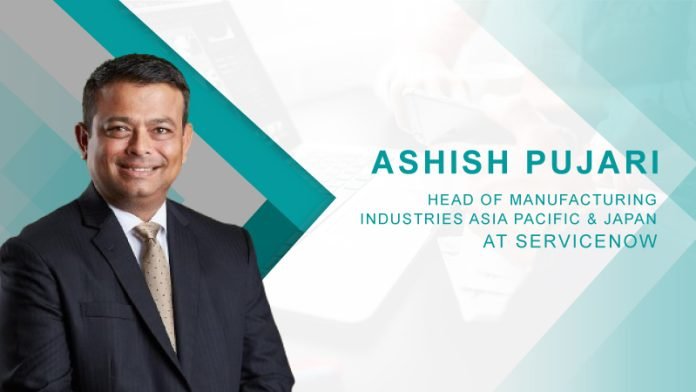With over 30 years of experience, Ashish, could you please highlight some of the milestones that you have achieved throughout your ongoing journey?
My professional journey over three decades has been extremely fulfilling. It was a sheer coincidence when I initially got into the domain of supply chain and manufacturing, but over the years, each incremental step boosted my passion for this topic. Right from engaging with the world’s largest semicon manufacturer in Taiwan to drive operational efficiencies, to working with some of the largest automotive companies in Japan and India to drive shop floor innovation through automation, to engaging with large mining companies in Australia to change their mindset on innovation, balancing cost and customer service, every single engagement was groundbreaking. I had the privilege to work with best of breed solutions like Manugistics and i2 Technologies (those brands don’t exist any more), lead high performing teams at Capgemini, SSA Global, JDA and SAP and learn from doyens in this industry. Between all this, my engagement in two start-ups and with some of the leading universities in Asia, was simply an icing on the cake. And I am now here at ServiceNow with a unique opportunity to build the Manufacturing business in APAC and Japan with an intelligent platform and smart workflow solutions at the core.
Kindly share insights into your educational background and how it has contributed to your professional journey in your current role, especially your MBA from Surrey European Management School and your certificate in Business Sustainability Management from the University of Cambridge.
When I completed my engineering degree in Electronics and Communications, I was in a strange dilemma. I didn’t want to pursue an engineering profession and honestly I had no idea how to leverage all the 4 years of engineering learning. It was by a quirk of fate that I got involved in Manufacturing and thus developed an interest in areas like Demand Planning, Material Planning, Manufacturing Capacity planning etc. This led to my MBA where I delved deeper into Operations Research to get a better understanding of the mathematics behind planning algorithms. This knowledge has helped me in my pursuit of supply chain as an industry. As we all know, responsible supply chain as a topic has a deep interlink with sustainability. This can be across the full spectrum of ESG – circular economy, sourcing, carbon management, health and safety etc, and I decided to do the sustainability course from Cambridge to get deeper insights on SGDs, Scope 3 metrics etc. My other objective was to learn from fellow colleagues of the course.
Please shed some light on your roles and responsibilities as the AP&J Head of Manufacturing Industry Vertical at ServiceNow.
ServiceNow as we all know is an intelligent workflow company. Sitting on a robust platform with AI/ML built in, we are uniquely positioned to solve customer challenges that standard best of breed applications cannot. My role is to build the Manufacturing Industries business for ServiceNow in the APAC and Japan region. Particularly, the focus is on sub industry verticals like Automotive, Heavy Industries, Consumer Goods and Chemicals. In this role I lead a team that has deep domain knowledge of the Manufacturing industry across the entire value chain from product design to customer service. My role is also to enable the ServiceNow field teams and work closely with partners to grow the business.
How do you stay connected with the emerging trends and technologies in the digital supply chain, Industry 4.0, and sustainability, and how do you incorporate them in your capacity at ServiceNow?
The best way to keep abreast with the latest in technology as well as what’s going on at the customer end is through the network I stay connected to. Obviously social media is a great place to keep ourselves updated but validation of all that information comes from my network. I am also plugged into the startup community in Singapore and India through a few venture fund network and PE network. I am an active participant in some networking groups like EGN (Executive General network), Supply Chain Asia & Global Supply Chain Council which helps me to be on top of the latest and greatest innovations.
What are your strategies to drive growth and innovation within the manufacturing industry in the AP&J region?
APAC and Japan regions are extremely diverse when it comes to sub-industries, maturity levels, talent cost and availability, investment appetite and other cultural aspects. Hence, a one-shoe-fits-all approach will create a backlash. Also, Asian customers hate to be first movers since their risk appetite is low. So, the strategy is to pick one or two sub-industries per country, have a maniacal focus on penetrating the top 3 accounts in that sub industry either direct or through partners and showcase the early adopter’s success. It will create a halo effect that might help to scale. Same goes for establishing partnerships. I’m looking at 2 partners per sub vertical per country to help scale. That will help us establish trust and investments from both sides. These partners could also develop some point solutions to complete the story.
Can you elaborate on your approach to delivering value to customers and partners, especially within distribution-intensive sectors such as CPG, pharmaceuticals, chemicals, oil and gas, and consumer electronics?
ServiceNow is a SaaS vendor. In the SaaS business, renewals are one of the toughest if the customer has not consumed the software or hasn’t seen value. Our Inspire value and Customer Operations) get engaged early to help plan the implementation roadmap and via our own services team or partner resources we bring our promises to life.
In your opinion, what are the most critical factors for successful complex solution sales in the technology sector?
While there is no silver bullet to a successful sale of a complex solution, some broad areas that one should focus are:
(a) involvement of the Business and not just CIO organisation
(b) Keep the scope small and manageable so that results are delivered every few weeks and not months or years.
What motivates you the most to drive digital transformation and innovation in the manufacturing sector, and how do you envision the future of manufacturing, including the role ServiceNow plays in shaping that future?
In a lot of countries in APAC & Japan, manufacturing is a very important industry. This industry has been a laggard when it comes to innovation. With the external forces of geopolitical tensions, pandemics, skills shortages and cost issues, this industry is trying to leapfrog its peers by looking at innovation at scale to be deployed rapidly. The Manufacturing value chain is rapidly evolving and embracing new business processes and new business models to address issues like cash flow, cost of operations, manufacturing efficiencies, streamlining logistics and supply chain, customer churn etc. I feel, a platform company like ServiceNow with intelligent workflows and a low-code, no-code engine to create unique business processes is a perfect answer.

Ashish Pujari Head of Manufacturing Industries Asia Pacific & Japan, ServiceNow
Ashish Pujari (Ash) leads Manufacturing GTM for ServiceNow across Asia Pac & Japan region. He has spent over three decades in the Supply Chain & Manufacturing industry as a practitioner, consultant, sales leader and business leader across leading consulting and supply chain companies. He has deep domain expertise in distribution intensive industries like Consumer Goods and Retail as well as Asset Intensive industries like Automotive, heavy engineering, Chemicals and Oil & Gas. Ash has also spent a lot of time helping companies drive automation through Industry 4.0 initiatives around intelligence, automation and creating new business processes. Ash was personally involved in transformation work in Fortune 500 companies in APAC, Japan and Europe. Ash is a trained leader in Six Sigma, lean manufacturing & sustainability. Ash has held leadership positions in world class companies like SAP, JDA/BlueYonder, Cap Gemini. He has also been a founder of two successful startups in the Supply Chain space.












